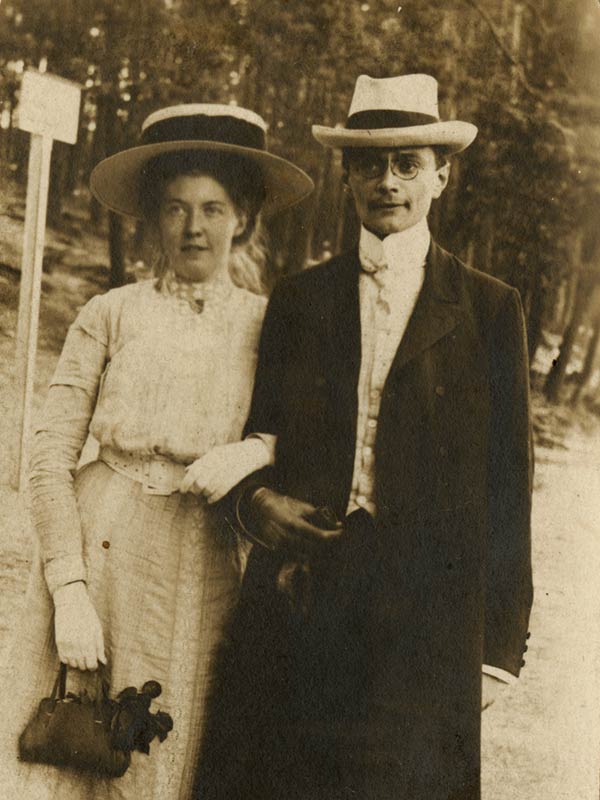Subtotal: $
Checkout
Receiving What We Ask For in Prayer
Eberhard Arnold writes a love letter to his future wife responding to her question about answered prayers.
By Eberhard Arnold
September 28, 2022
On April 9, 1907, Emmy Arnold wrote to her fiancé a question regarding prayer: “In Matthew 7:7–12 it says that God will give you everything you pray for in faith. Yesterday my sisters and I were talking, and I quoted the passage, ‘If you had faith, you could move mountains.’ At this, Olga said she understood these words differently; otherwise I should (for example) pray that you’d be finished with your studies in a week. What do you think? Frau Baehr explained her view on this by quoting Matthew 7:13–15: ‘Enter through the narrow gate.’ But what about verses 15–23? Please write.”
These letters are from the collection Love Letters.
My dear, sweet Emmy,
How I look forward to seeing you the day after tomorrow and to discussing everything with you! You know, last night I got really sad – I was also very tired, of course – realizing how unworthy I am of you. I have to be honest: the thought came to me that you are going to be very disappointed in me, in many ways, when you get to know me better, even though I have tried as best I can to show myself to you just as I am. But then I fell on my knees again and couldn’t do anything but give thanks, thanks, and more thanks! O Emmy, how I thank you for your love! I don’t believe you have any idea yet what it means to me. But eternity will show that, for through God’s incomprehensible grace I believe we are indissolubly bound forever.

Eberhard and Emmy Arnold as an engaged couple, 1908. Photograph courtesy of the Bruderhof Archive
I thank you a thousand times, too, for your long, loving letter. Like yesterday’s, it arrived early and brought me deep joy. I don’t know why you feel you said too much – I think it was good that you expressed your views regarding social life, etc., so plainly. I agree with you point for point. “Put off the world, and put Christ on; that way the task is fully done,” says an old rhyme.
As for prayer, whether a request is answered depends on two conditions:
1. Faith – that is, the certainty you have already beforehand that you will be answered. Faith comes through dedication to Christ. See, for instance, Matthew 21:21–22: “I tell you the truth, if you have faith and do not doubt, not only can you do what was done to the fig tree, but also you can say to this mountain, ‘Go, throw yourself into the sea,’ and it will be done. If you believe, you will receive whatever you ask for in prayer.” Matthew 17:20: “…because you have so little faith. I tell you the truth, if you have faith as small as a mustard seed, you can say to this mountain, ‘Move from here to there’ and it will move. Nothing will be impossible for you.” And James 1:5–8: “If any of you lacks wisdom, he should ask God, who gives generously to all without finding fault, and it will be given to him. But when he asks, he must believe and not doubt, because he who doubts is like a wave of the sea, blown and tossed by the wind. That man should not think he will receive anything from the Lord; he is a double-minded man, unstable in all he does.”
As a true Christian – and those are the only people we’re talking about – I can have faith and certainty only when I am sure, through the Word and the Spirit, that my prayer is (in accordance with God’s will) for wisdom (James 1:5), for grace (Rom. 5:2), or for the Holy Spirit (Luke 11:13).
2. The second condition is referred to in the Bible by the phrase “in the name of Jesus”; that is, in his place, on his behalf, and with his purpose and Spirit, as if he himself were doing it. See, for example, John 14:12–13: “I tell you the truth, anyone who has faith in me will do what I have been doing. He will do even greater things than these, because I am going to the Father. And I will do whatever you ask in my name, so that the Son may bring glory to the Father.” And John 16:23: “In that day you will no longer ask me anything. I tell you the truth, my Father will give you whatever you ask in my name.”
This is of course possible only for someone who is fully converted, someone who is righteous; someone who has been renewed through Jesus and in whom Jesus lives and rules. See James 5:16: “Confess your sins to each other and pray for each other so that you may be healed. The prayer of a righteous man is powerful and effective.”
You see then that such a foolish prayer as asking that I should finish my last two years of study and receive my PhD within a week, or that I should get 100,000 marks, stand entirely outside the biblical way of thinking. Certainly, we can and ought to ask for earthly things, but always in the name and spirit of Jesus Christ, believing in him and his word and abandoning our self-will. If we want to understand and experience the scriptures, we must be utterly sincere in having surrendered ourselves totally to Jesus.
Matthew 7:7–11 is not talking about any and every request (after all, it advises us to seek and knock). Rather, as shown by the context, which must always be considered, it is talking about prayers firstly for the Holy Spirit’s help in discernment and in caring for souls – Matthew 7:1–6. See also Luke 11:13: “If you then, though you are evil, know how to give good gifts to your children, how much more will your Father in heaven give the Holy Spirit to those who ask him.”
“Certainly, we can and ought to ask for earthly things, but always in the name and spirit of Jesus Christ, believing in him and his word and abandoning our self-will.”
Secondly, this chapter is about praying for entry into God’s kingdom, and conversion to Jesus – Matthew 7:13–14: “Enter through the narrow gate. For wide is the gate and broad is the road that leads to destruction, and many enter through it. But small is the gate and narrow the road that leads to life, and only a few find it.”
Now I’ve gotten completely carried away, though I only intended to write a little. I have a terrific amount of work to do before Saturday. Pray for me.
Just a few more things. Matthew 7:15–23 say clearly that it is not praying or doing great deeds that frees us from condemnation, but only submitting our will completely and absolutely to God, doing his will unwaveringly (verse 21), and believing in Jesus and his word (verse 24) …
Loving you more and more in Jesus, and faithfully yours,
Ebbo
Already a subscriber? Sign in
Try 3 months of unlimited access. Start your FREE TRIAL today. Cancel anytime.






